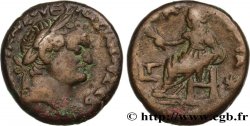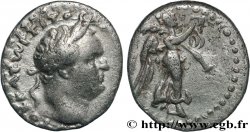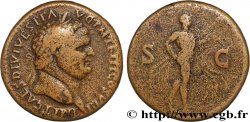bpv_632166 - TITUS Tétradrachme syro-phénicien
недоступный.
Товар уже продан в нашем интернет-магазине (2022)
Цена: : 125.00 €
Товар уже продан в нашем интернет-магазине (2022)
Цена: : 125.00 €
Тип Tétradrachme syro-phénicien
Дата: 71-72
Монетный двор / Город: Antioche, Syrie, Séleucie et Piérie
Металл: silver
Диаметр: 26 mm
Ориентация осей монеты: 12 h.
Вес: 14,50 g.
Редкость: R1
Комментарии о состоянии
Exemplaire sur un flan large et ovale, mais court sur la légende de droit à l’usure importante, lisible au revers et identifiable. Patine grise superficielle
Ссылки в каталоге: :
Лицевая сторона
Аверс: описание: Tête laurée de Titus à droite avec l’égide (O*4), légende débutant à la pointe du buste.
Аверс: легенда: [AUTOK]R TITOS K[AIS OUESP] (Autokrator Titos Kaisaros Ouespasianos).
Аверс: перевод: (l’empereur Titus césar Vespasien).
Обратная сторона
Реверс: Описание: Aigle debout à gauche sur une palme, les ailes déployées ; dans le champ à gauche, une massue posée verticalement.
Реверс: легенда: [ETOUS G] - IEROU (Etous gamma Ierou).
Реверс: перевод: (année sacrée troisième du règne).
Комментарий
La base TSP répertorie actuellement soixante deux exemplaires dont en musées Israel State Museum (2), Glasgow, ANS (2), Jérusalem, Yale, Jerusalem Hebrew University .








 Cообщить об ошибке
Cообщить об ошибке Распечатать страницу
Распечатать страницу Отправить мой выбор
Отправить мой выбор Задать вопрос
Задать вопрос Consign / sell
Consign / sell
 Информация
Информация



